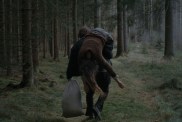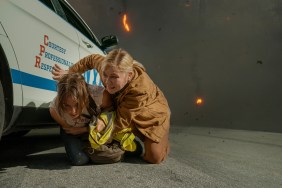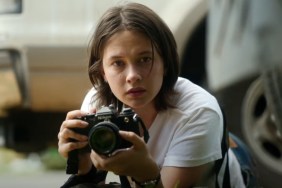
The singularity has become the biggest source of fear for sci-fi films as of late. Just recently we’ve had Transcendence, Lucy, Her and Chappie and in less than a month from now, Avengers: Age of Ultron. But before the comic book herd gets its fill Alex Garland‘s feature directorial debut Ex Machina arrives as one of the most cerebral portrayals yet, from both a logical and emotional perspective. It delves into the excitement of creating an artificial piece of intelligence that could manage to convince us it’s human as well as the fear of what might happen if not only we begin to believe it’s human, but mostly what if it begins to believe and, more than just believing, what if it begins to fear for its own survival?
Garland, best known for his screenplays for films such as Sunshine and 28 Weeks Later…, takes his first stab at directing a feature film and is unafraid of delving right in, shaping Ex Machina more as a stage play than anything else. Other than a couple of brief sequences outdoors, the story takes place primarily within one location, that being the secluded mountain estate of tech giant CEO, Nathan Bateman (Oscar Isaac).
Nathan’s company, Bluebook, is the equivalent of today’s Google, perhaps even more powerful as it accounts for more than 90-percent of the world’s Internet search queries, but he’s interested in something well beyond simple online searches. His latest endeavor is into artificial intelligence, an endeavor that has resulted in the miraculous Ava (played by Alicia Vikander), A.I. so close to being a real human if it wasn’t for her exposed circuitry you’d never know the difference.
To test Ava’s capabilities, Nathan devised a competition for his Bluebook employees, the lucky winner being rewarded the opportunity to spend a week with Nathan at his home, though the reason is not initially known. Caleb Smith (Domhnall Gleeson) is the company’s lucky winner. A pat on the back from his co-workers and seconds later he’s whisked away to Nathan’s private estate where he walks through open doors, completely oblivious to what he’s walking in on.
Nathan’s goal is for Caleb to put Ava through a Turing test to determine her (or should it be “its”?) ability to exhibit human behavior and whether or not she, outside of her physical appearance, is indistinguishable from a human being. It’s hard to say just how smart Garland was in crafting this scenario without spoiling portions of the film. For as simple as it sounds there are complex layers of intelligence at work here, turning a relatively simple scenario into a believably experience that’s equally emotional as well as terrifying.
Isaac plays Nathan with a bit of a reckless abandon. Often drinking, or flat out drunk, he would appear to be a genius that has lost touch with reality. And maybe he has, or maybe it’s just a façade. Either way, his aloof nature keeps the audience and Caleb on their toes, uneasy as to what he might be hiding, or even scarier, what he’s completely oblivious to.
Along with Isaac, Gleeson and Vikander are wonderful compliments to one another. Isaac the soft-spoken, strangely off-beat genius, Gleeson the sad tech-nerd and Vikander carries the show with a “is she really a robot?” performance. Her’s is a performance on which the film hinges. Isaac and Gleeson are great, both bringing to life certain personality traits that not only make them human, but allow certain questions and moral quandaries to surface with ease, but none of that would work had Vikander not melted so easily into the role of Ava. Vikander doesn’t create a human out of Ava as much as she creates a robot questioning what it means to behave and act like a human, this all before the film reaches the question of morality, which is the same time Ava will be convincing more than just the characters in the film she has the capacity for human thought and behavior.
The brilliance of Ex Machina is that it doesn’t attempt to be smarter than it is. It doesn’t have to, because it is that smart but in the most simplest of ways. It sets out to ask all the questions, all the dangers when it comes to free-thinking A.I. and is just as caught up with human technological advancement as it is the resulting destruction of the species should A.I. advance to such levels.
The intimate nature of the storytelling, captured within just a few walls of Nathan’s home, doubling as his glass-walled research facility, makes the movie all the more immediate and, at times, claustrophobic. Bedroom walls made of concrete and no windows are one thing, but night time alarms alerting Caleb to a power failure as the red glow of emergency lights shine turn such a scenario into a very real moment of horror.
Powered by Geoff Barrow and Ben Salisbury‘s mood-enducing score, pulses in the background, accompanying the softly cinematic work of Rob Hardy behind the camera.
This is one of those sci-fi films that will be heralded by cinephiles for years to come and in this day and age may actually be able to find a foothold among general audience members at the same time. If not, no worries, it’s bound to become a film that will be watched over the years as Garland will, hopefully, continue to explore more work as a director as he’s been keeping this additional talent from us long enough.









